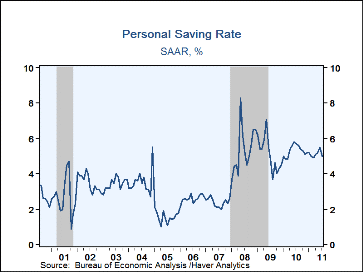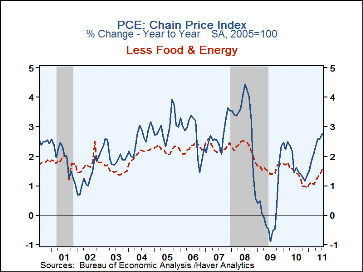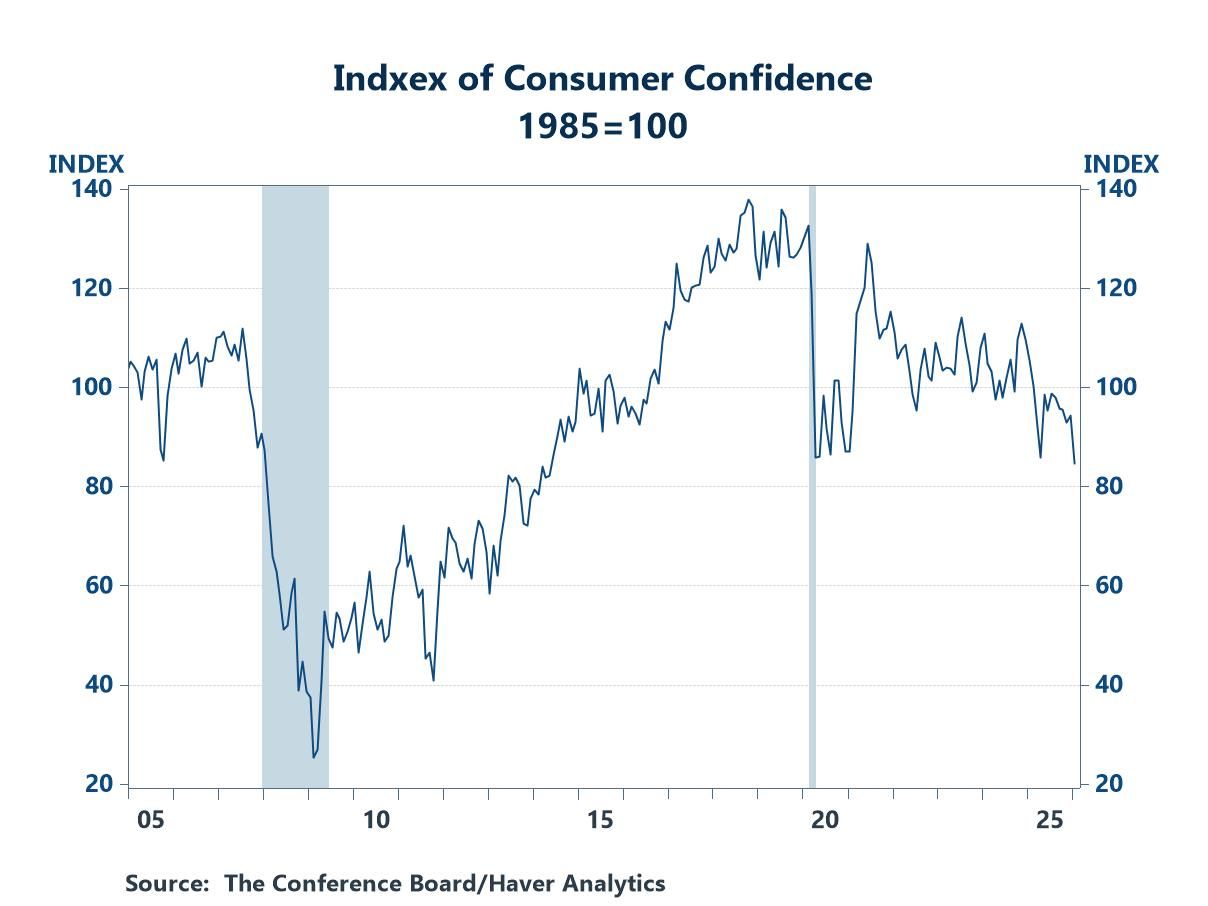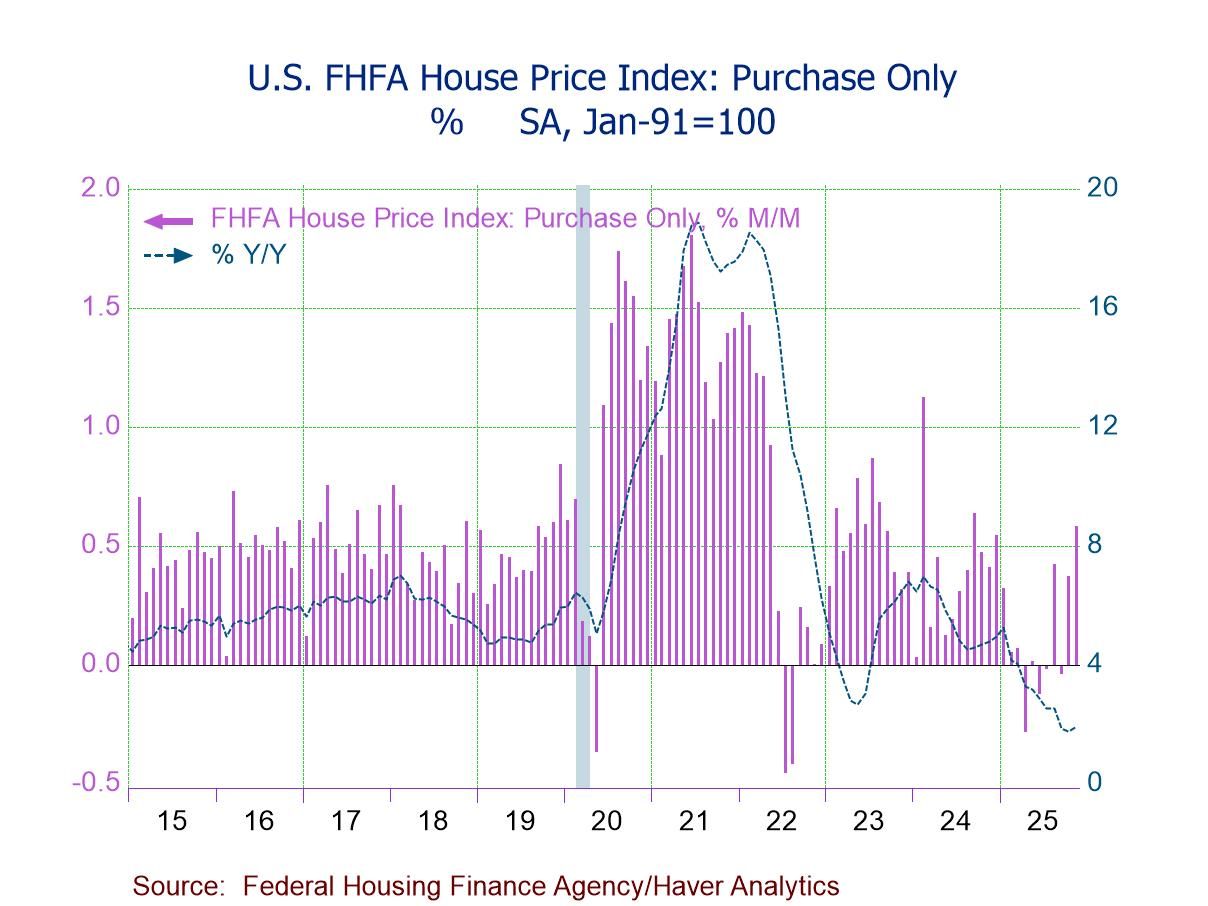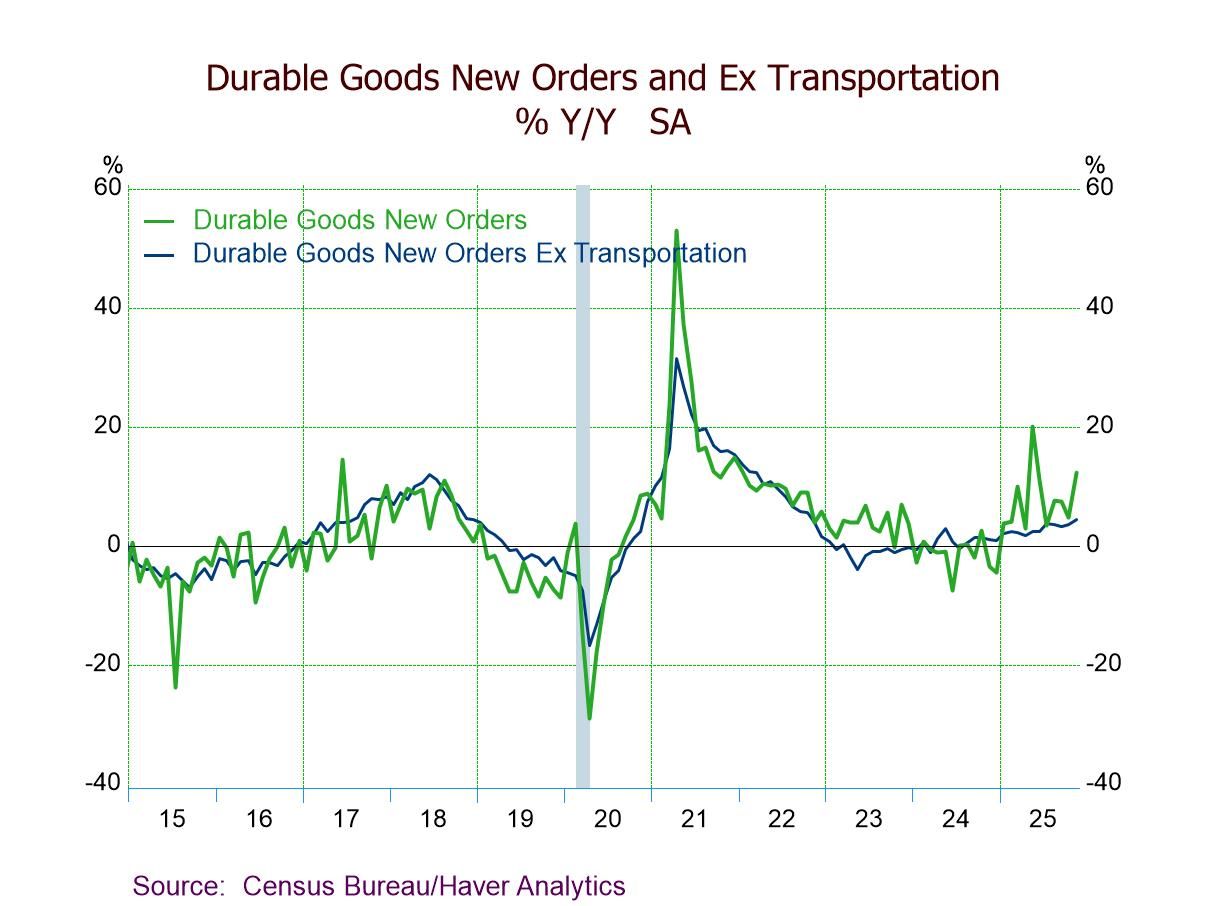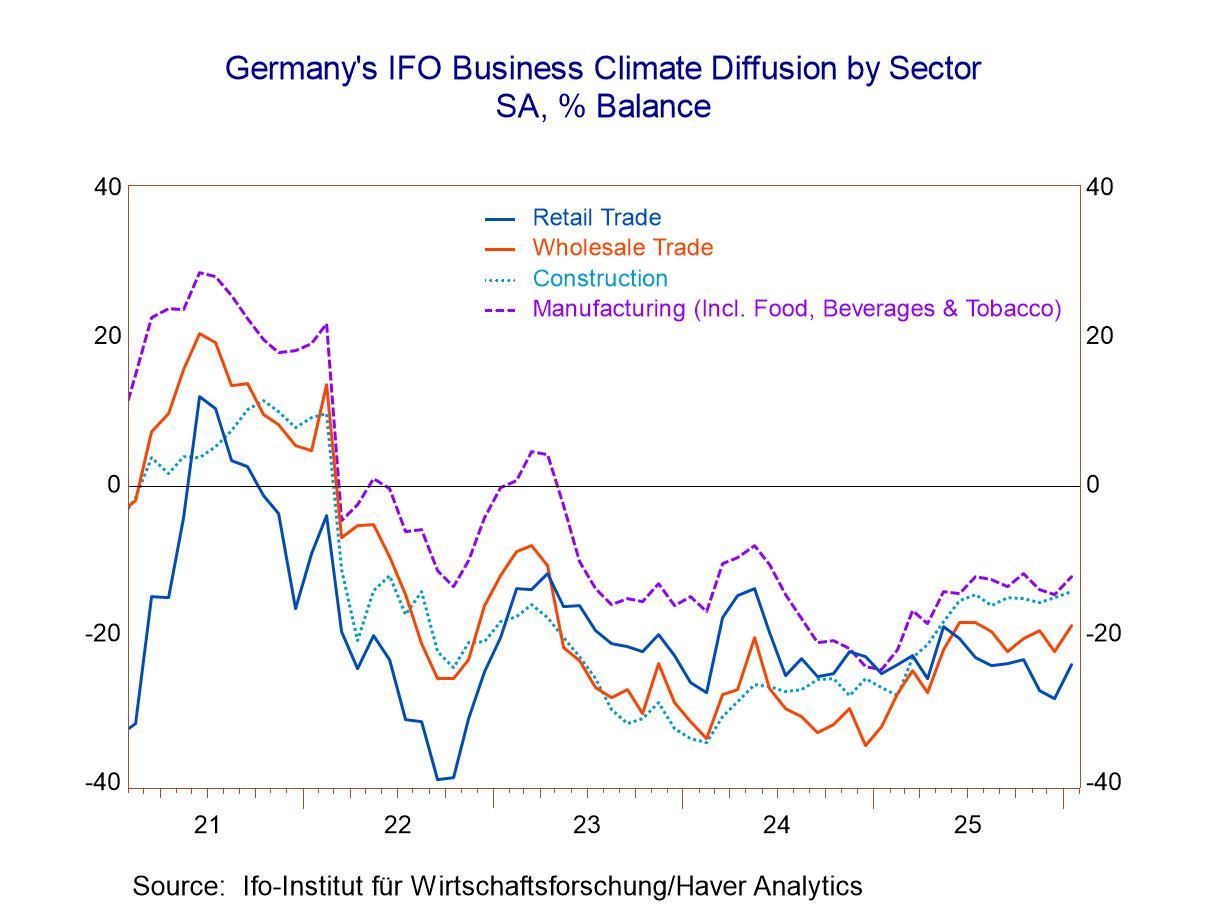 Global| Aug 29 2011
Global| Aug 29 2011U.S. Personal Income & Spending Improve With Higher Prices
by:Tom Moeller
|in:Economy in Brief
Summary
Personal income matched expectations and rose 0.3% last month following a revised 0.2% June increase, initially reported as 0.1%. Disposable income also rose a slightly improved 0.3%. These gains, however, were eroded by a faster [...]
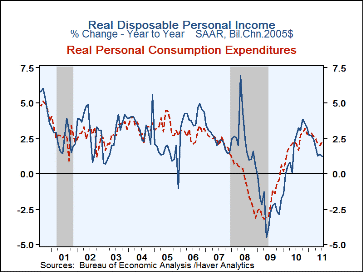 Personal income matched expectations and rose 0.3% last month
following a revised 0.2% June increase, initially reported as 0.1%.
Disposable income also rose a slightly improved 0.3%. These gains,
however, were eroded by a faster increase in prices. Constant dollar
take-home pay slipped 0.1% last month after an upwardly revised 0.3% June
rise. Real take-home income increased 1.2% (AR) during the last three
months and that was slightly improved versus Q2.
Personal income matched expectations and rose 0.3% last month
following a revised 0.2% June increase, initially reported as 0.1%.
Disposable income also rose a slightly improved 0.3%. These gains,
however, were eroded by a faster increase in prices. Constant dollar
take-home pay slipped 0.1% last month after an upwardly revised 0.3% June
rise. Real take-home income increased 1.2% (AR) during the last three
months and that was slightly improved versus Q2.
Wages & salaries rose 0.4% during July after a 0.1% uptick in June. The gain was driven by the slight increase in payroll employment. Amongst other categories, the most pronounced increase was in rental income which surged 1.3% (14.1% y/y) after three months of moderate decline. Proprietors' income gained 0.3% (6.0% y/y). Transfer payments inched up 0.1% and the easier y/y increase of 4.1% contrasted to 13.8% in 2009, lifted by the poor job market. A better economy also raised dividend income last month by 1.0% (9.2% y/y) following last year's 19.9% jump. Interest income slipped 0.1% (2.3% y/y). That followed a 9.5% decline last year and a 19.8% drop in 2009.
Personal consumption expenditures gained 0.8% in July after a downwardly revised 0.1% slip during June. A 0.5% July increase had been expected. Spending on durable goods surged 1.9% (6.7% y/y) as expenditures on motor vehicles rose 5.3% (9.2% y/y). That followed four consecutive months of decline. Spending on furniture also rose an improved 0.6% (4.7% y/y) but apparel expenditures inched up just 0.2% (6.6% y/y). The rise in prices pulled outlays on gasoline 2.2% higher (26.5% y/y). Services spending rose 0.7% (3.4% y/y), paced by a 6.1% annual increase in food services & accommodations and a 4.9% rise in spending on health care. In constant dollars, real personal consumption expenditures rose 0.8%.
The personal savings rate slipped to 5.0%, the lowest level since March.
The PCE chain price index jumped 0.4% last month (2.8% y/y) with the rise in gasoline prices. The gas price index rose by one-third y/y. The core PCE price deflator rose a lesser 0.2% and by 1.6% y/y. That's up from the record low year-to-year change of 0.9% reached this past December. Notable amongst the categories was a 3.8% y/y increase in the price index for motor vehicles.
The personal income & consumption figures are available in Haver's USECON and USNA databases. The expectations figures are in the AS1REPNA database.
| Personal Income & Outlays (%) | Jul | Jun | May | Y/Y | 2010 | 2009 | 2008 |
|---|---|---|---|---|---|---|---|
| Personal Income | 0.3 | 0.2 | 0.3 | 5.3 | 3.7 | -4.3 | 4.6 |
| Wages & Salaries | 0.4 | 0.1 | 0.3 | 3.9 | 2.2 | -4.3 | 2.0 |
| Disposable Personal Income | 0.3 | 0.2 | 0.2 | 4.0 | 3.6 | -2.1 | 5.8 |
| Personal Consumption Expenditures | 0.8 | -0.1 | 0.1 | 5.1 | 3.8 | -1.7 | 2.7 |
| Saving Rate | 5.0 | 5.5 | 5.2 | 5.7 (Jul'10) |
5.3 | 5.1 | 5.4 |
| PCE Chain Price Index | 0.4 | -0.1 | 0.2 | 2.8 | 1.8 | 0.2 | 3.3 |
| Less Food & Energy | 0.2 | 0.2 | 0.3 | 1.6 | 1.4 | 1.6 | 2.3 |
| Real Disposable Income | -0.1 | 0.3 | 0.1 | 1.2 | 1.8 | -2.3 | 2.4 |
| Real Personal Consumption Expenditures | 0.5 | -0.0 | -0.0 | 2.3 | 2.0 | -1.9 | -0.6 |
Tom Moeller
AuthorMore in Author Profile »Prior to joining Haver Analytics in 2000, Mr. Moeller worked as the Economist at Chancellor Capital Management from 1985 to 1999. There, he developed comprehensive economic forecasts and interpreted economic data for equity and fixed income portfolio managers. Also at Chancellor, Mr. Moeller worked as an equity analyst and was responsible for researching and rating companies in the economically sensitive automobile and housing industries for investment in Chancellor’s equity portfolio. Prior to joining Chancellor, Mr. Moeller was an Economist at Citibank from 1979 to 1984. He also analyzed pricing behavior in the metals industry for the Council on Wage and Price Stability in Washington, D.C. In 1999, Mr. Moeller received the award for most accurate forecast from the Forecasters' Club of New York. From 1990 to 1992 he was President of the New York Association for Business Economists. Mr. Moeller earned an M.B.A. in Finance from Fordham University, where he graduated in 1987. He holds a Bachelor of Arts in Economics from George Washington University.


